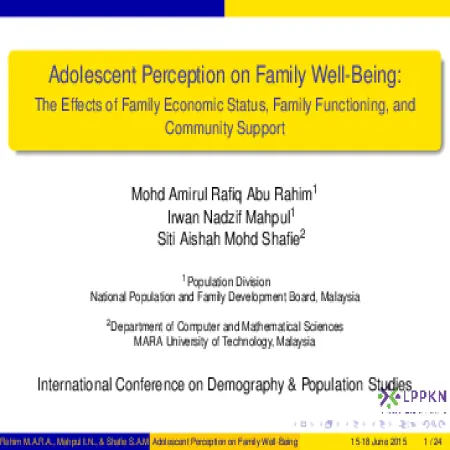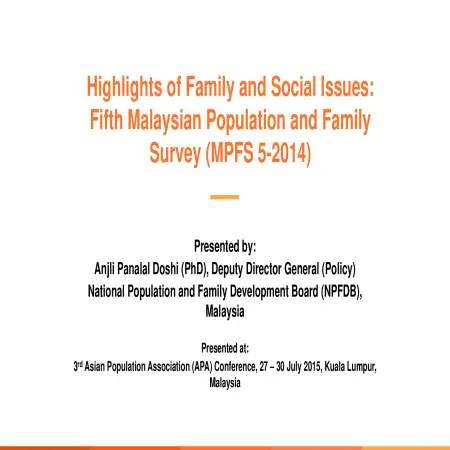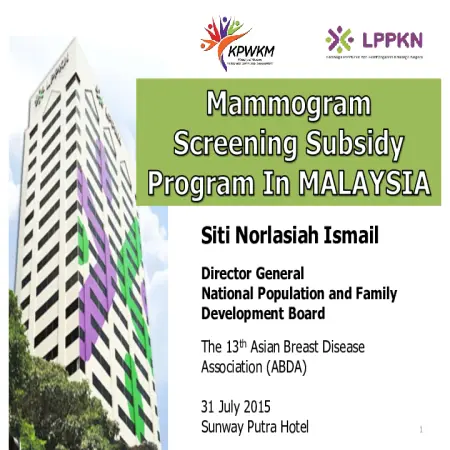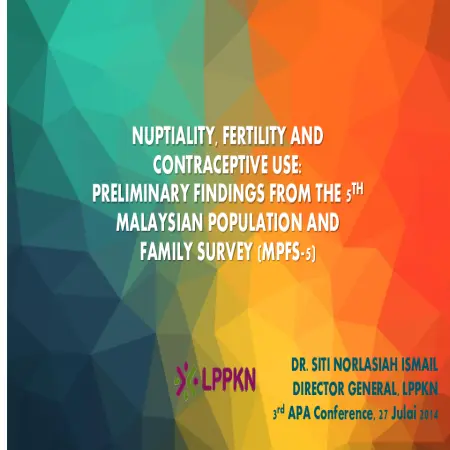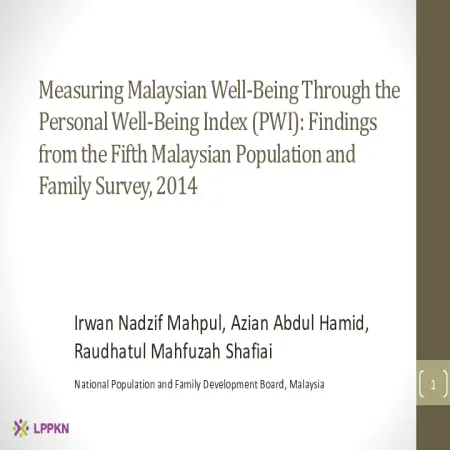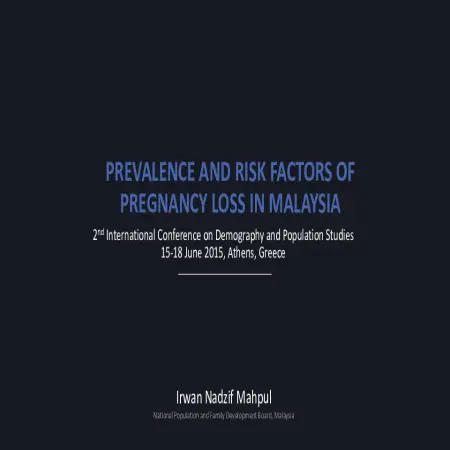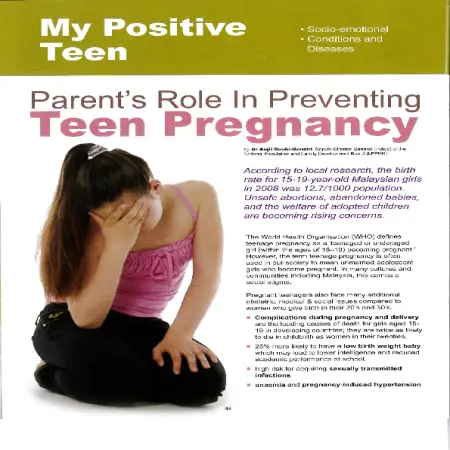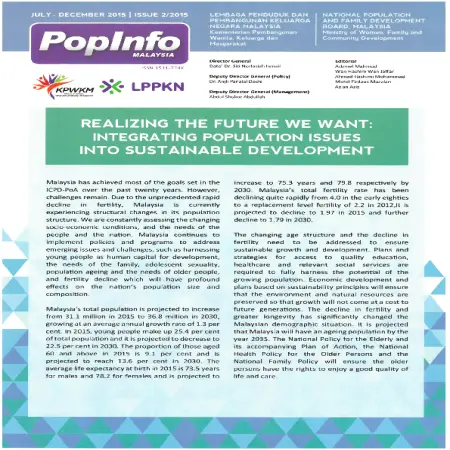PUBLICATIONS
|
|
Gaya hidup wanita dan faktor risiko kanser payudara: satu kajian literatur
Item Type: Article
Editor:
Year: 00/00/2015
Abstract: Breast cancer is currently the most common cancer in women worldwide. It is said that there is no proven method of preventing cancer. However, studies have shown that there are some women’s lifestyle factors that have been scientifically shown to increase the risk of breast cancer. A review of the literature from the epidemiological, medical, and psychosocial disciplines strives to analyse factors that tend to increase the risk of developing breast cancer. Published material reviewed concerning the connection between breast cancer risk and lifestyle factors such as diet and physical activity. This review shows that several women’s
lifestyle factors have been regularly considered as risk factors for developing breast cancer. They include women who have not had children or women who had their first child at an older age, short duration of brestfeeding or not breastfeed at all, diet and nutrition, and psychological stress.
|
|
|
|
|
|
Adolescent perception on family well-being: the effect of family economic status, family functioning, and community support
Item Type: Conference or Workshop Item
Editor:
Year: 00/00/2015
Abstract: The objective of this presentation is to examine the difference of family well-being across several demographic information and to examine the relations between the family well-being in adolescents perceived family economic status, quality of family functioning, and community and neighbourhood support.
|
|
|
|
|
|
Highlights of family and social issues : Fifth Malaysian Population and Family Survey (MPFS 5-2014)
Item Type: Conference or Workshop Item
Editor:
Year: 00/00/2015
Abstract: This slide Highlights of Family and Social Issues from finding of the Fifth Malaysian Population and Family Survey (MPFS 5-2014).
|
|
|
|
|
|
Mammogram Screening Subsidy: Program in Malaysia
Item Type: Conference or Workshop Item
Editor:
Year: 00/00/2015
Abstract: In Malaysia, a woman has a 1:19 life time risk of developing breast cancer in her lifetime. Breast cancer contributes 32.3% of all female cancers. To reduce the incidence of breast cancer, the Government has embarked on the subsidised Mammogram Screening Program. This aims at promoting greater awareness and encouraging women to undergo mammogram screening for early detection of breast cancer. The objective of this subsidy is to promote greater awareness on breast cancer and the importance of breast examination.
|
|
|
|
|
|
Nuptiality, fertility and contraceptive use: preliminary findings from the 5th Malaysian Population and Family Survey (MPFS -5)
Item Type: Conference or Workshop Item
Editor:
Year: 00/00/2015
Abstract: The current marital trend status shows more than 90 % are currently married while the percentage of divorce or separation is increasing. Next, current marital status by age group in 2014 showed that 93.1 % is currently married and 5.3 % among women 20-24 are divorce or separated. This paper discuss about nuptiality, fertility and contraceptive use from preliminary finding of the Fifth Malaysian Population and Family Survey (MPFS-5) 2014.
|
|
|
|
|
|
Measuring Malaysian well-being through the personal well-being index (PWI): findings from the fifth Malaysian Population and Family Survey, 2014
Item Type: Conference or Workshop Item
Editor:
Year: 00/00/2015
Abstract: The aim of this study is to measure the well-being of Malaysian population through the use of PWI scale developed by the International Wellbeing Group (IWbG). Responses on the PWI scale were collected from over 10,000 adults aged 18 to 59 drawn from a sample of 18,852 living quarters throughout the country. Through the MPFS-5, the Personal Well-Being Index for the Malaysian was recorded at 7.71 out of a maximum score of 10. Out of the eight domains identified, the Spirituality or Religion domain recorded the highest score of 7.56. It then followed by the domain scores of Personal Relationships (7.54), Community-Connectedness (7.52), Personal Safety (7.35), Personal Health (7.10), Future Security (6.96), Standard of Living (6.58) and Achieving in Life (6.56).
|
|
|
|
|
|
Prevalence and risk factors of pregnancy loss in Malaysia
Item Type: Conference or Workshop Item
Editor:
Year: 00/00/2015
Abstract: The objective of this paper is to study the prevalence and risk factors of pregnancy loss in Malaysia. The risk of pregnancy loss is highest among Indian, followed by Malay and Chinese. The risk of pregnancy loss increases with level of education, age at 1st marriage and number of previous non-live births.
|
|
|
|
|
|
Household chores and your child
Item Type: Article
Editor:
Year: 00/00/2015
Abstract: Getting your child to help out with household chores on a regular basis can be beneficial for him to grow into a successful adult. This is due to a sense of self-worth and competency, and he will also be more responsible in other aspects of his life. Another benefit is that he will be more likely to have better self-esteem and it also makes him feel like a part of the family.Indirectly, this will teach him about the importance of family responsibility.
|
|
|
|
|
|
Parent's role in preventing teen pregnancy
Item Type: Article
Editor:
Year: 00/00/2015
Abstract: The World Health Organisation (WHO) defines teenage pregnancy as a ‘teenaged or underaged girl (within the ages of 15–19) becoming pregnant.’ However, the term teenage pregnancy is often used in our society to mean unmarried adolescent girls who become pregnant. In many cultures and communities including Malaysia, this carries a social stigma.
Pregnant teenagers also face many additional obstetric, medical & social issues compared to women who give birth in their 20’s and 30’s.
|
|
|
|
|
|
Realizing the future we want: integrating population issues into sustainable development
Item Type: Newsletter
Editor:
Year: 00/00/2015
Abstract: Malaysia is closely monitoring the developments and discussion on the post-2015 development agenda. Malaysia believes that the post-2015 development agenda should integrate existing international commitments and outcomes of UN conferences and deliver on equality, social inclusion, decent work, and sustainable livelihoods.
|
|
|
|






